Could the biblical practice of gleaning cut food waste?
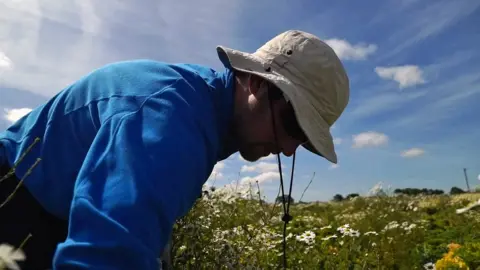 BBC
BBCIt is a hot July day in Lancashire and a dozen people are gathering on a dusty farm track two miles outside the market town of Ormskirk. They are gleaners - volunteer harvesters picking what's left in the ground.
It's for a good cause: the unwanted kale from this farm will be donated to local food projects and charities. And it is good weather; the broad blue sky is softly streaked with cirrus clouds. Cabbage white butterflies flit between the chamomile blooms and bushy deep green brassica leaves.
Feedback Global is one of a handful of campaign groups organising gleans across Britain. It's seen its efforts swell - more than doubling the days in the fields between 2014 and 2018, working with four times as many volunteers and harvesting more than a hundred tonnes of unwanted fruit and vegetables from farms - that would otherwise be left to rot.
But the group doesn't want to boast about that. "Long term, we don't want to be doing this anymore," explains coordinator Josephine Payne. "We want there to be no waste - the farmers growing what they need and managing to sell it."
Gleaning is not new, the Old Testament guides farmers to leave overlooked produce for the poor, strangers and more specifically widows and orphans.
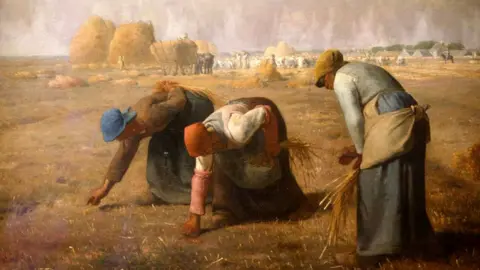 Getty Images
Getty ImagesFarmers across faiths and continents habitually left a little for the needy. In 18th Century England gleaning was a legal right for the landless. But it ebbed away in modern life, eroded by technology and regulation, left to live on quietly in faith led charities wanting to ease societal hunger - until now.
Josephine admits thinking about how much food goes unused can leave her feeling overwhelmed. And today a report from the charity Wrap highlights her fears are not unfounded - with 3.6m tonnes of food unused or surplus at farm level. That's 7.2% of fruit, vegetables, crops or livestock - worth £1.2bn at market.
"A key finding has been the range of waste across all food categories," says Peter Maddox, director at Wrap. "This tells us is there is huge potential to reduce the amount of surplus and waste by promoting best practice, and that's where our work is now focussed."
The gleaners are doing something the charity wants to see done large scale across the industry - increasing redistribution by working together.
Indeed, all kinds of people are busy in the field. Five ex-army vets are getting their hands mucky as part of their recovery programme. A couple more women are regulars setting up a picnic for the team. "Everyone says they sleep well after," laughs Josephine.
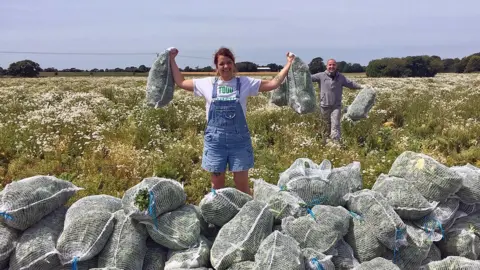
Two gleaners are new; but 21-year old Klaudia Jedyka and 24-year-old Martin Paley have both already thought hard about what they buy, eat then chuck away. "You go to the supermarket and everything is just there but most of it goes to waste," says Klaudia.
"We're a bit of a comfortable society, where everything is done for us."
And even though both are up on environmental issues and have protested, they want to do even more to solve what they see as a crisis. "You do look back at the field and think, we've done a tiny proportion," says Martin.
"And then you question the bigger picture. Why is this food being wasted in the first place? Why can't some people afford good food? It's a bit of a plaster on the problem."
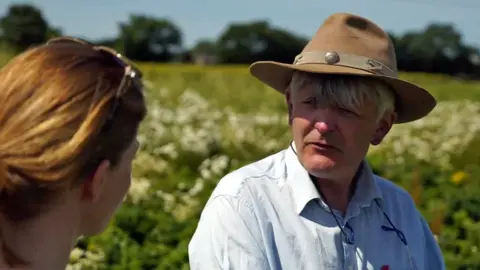
Signing up is a no-brainer for farmer Chris Molyneux. "This is going to be of no use to me now," he says, kale in hand, gesturing to the field around him where some of the leaves have started to turn yellow and mingled in amongst the wildflowers.
Any crop left will be ploughed into the soil as fertiliser. "It would be nice if we could sell a bit more, get rid of a bit more, use a bit more."
His family started growing kale 30 years ago, before it was trendy and in truth before anyone really wanted to eat it. He took a chance with the crop and he's taken a chance on the gleans - but he takes a chance every single season with his business.
"The thing about nature is, some years you'll get 50-100% extra. Then some years, you'll get nothing," he says. "It's very difficult to work out, as a grower. You put in what you think you're going to be able to sell."
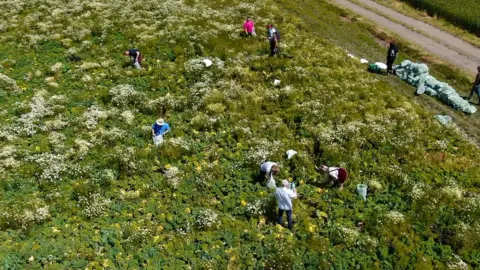
Chris says he's always thinking of new ways to reduce waste and be more efficient but "there's a risk nature will intervene and throw a curveball".
Wrap maintains the key to reducing waste is cooperation. The charity is working with Defra to launch a scheme for farmers to share data, ideas and innovations - and a second Food Surplus Network to help those in agriculture find uses for unused produce.
But waste reduction is not the biggest gain for this farm - nor indeed many of those now sunburned and pink-cheeked after a day bent over in the meadow. All have just simply loved being there.
"I love talking to them, I love seeing different people coming on to the farm," beams Chris. "That interface between the grower and the consumer is quite a wide one these days and I think it's great that we can bring the two together sometimes."
